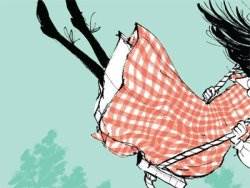Disability in classic children's literature
Published on: 21 Hydref 2013 Author: Alex Strick
To tie in with BookTrust's list of the 100 Best Books for children, Alex Strick reflects on disability representation in children's classics, how negative tropes persist to this day, and what to do moving forward.

I've recently come across several book lists recommending children's books relevant to disability - and featuring some rather unexpected titles.
Admittedly, with such a meager number of relevant books published each year, it can be tricky to create a list of titles all achieving perfection in terms of their portrayal of disability. However, at first glance, some of the examples recommended on the lists may seem like positively astonishing choices. I'm talking, for example, about the likes of Heidi, What Katy Did and The Secret Garden.
Whilst these undeniably feature disabled characters, the messages they convey about disability are hardly positive.
However, this then got me thinking about how, within context, such texts can perhaps serve a useful role in stimulating discussion about the way in which attitudes to disability and perceptions of disability have changed – and how much they need to continue to change in the future.
Historically, disability in children's literature of course so often tends to be linked with punishment for wrong-doing (this is certainly the case for Katy who falls off the swing she is warned not to use). Alternatively disabled characters may be virtuous invalids (like Pollyanna) or may simply be disabled because they lack faith, friendship, self-belief or fresh air (like Clara in Heidi or Colin in The Secret Garden).
Whilst these may seem rather extreme examples, I challenge you to find many positively depicted wheelchair users in classic children's literature.
Similarly, if you can call to mind any characters with some kind of deformity, scar or missing limb, I can pretty much guarantee that these will be villains, rather than heroic or even 'neutral' characters. Meanwhile any children's book figures of restricted growth you can think of are of course likely to be objects of comedy. Children's classics have tended to use disability as an unfortunate form of shorthand.
Sadly some of these tendencies are not as deeply buried in the past as we would like to think.
Even until quite recently, it was pretty rare to see a disabled character appear without comment. The description of the disability would still somehow be pivotal to the disabled character's personality and/or the plot. Or perhaps a dramatic twist would 'reveal' that (shock, horror) the character was disabled. We really do need more books to counter these messages, challenge the stereotypes and normalize disability.
Until recently it felt as if disabled characters could only be bitter, pitiful, saintly beyond belief, a metaphor, a plot device... but rarely just someone who happened to be disabled.
And then there were the many picture books which told us that 'despite' being disabled, even the lonely one-legged bird or the bullied wonky giraffe or could eventually find a friend or show that there is something that they are good at.
This is not to say that children's literature should try to iron out all the differences between individuals and present us all as identical. Not at all. We need books which address some of the questions and explore problems and challenges, if we are to help children handle different experiences and help non-disabled children learn.
We cannot pretend that bullying and prejudice simply don't exist anymore. However, we can ensure that we use books to help young audiences understand why these attitudes should not be accepted.
So as we strive towards a more diverse children's book landscape, perhaps revisiting the depictions of Captain Hook, Tiny Tim, Long John Silver or Rumplestiltskin from time to time along the way could actually serve to help remind us what we are aiming towards and why.
Topics: Classics, Reading for pleasure, Features






Add a comment